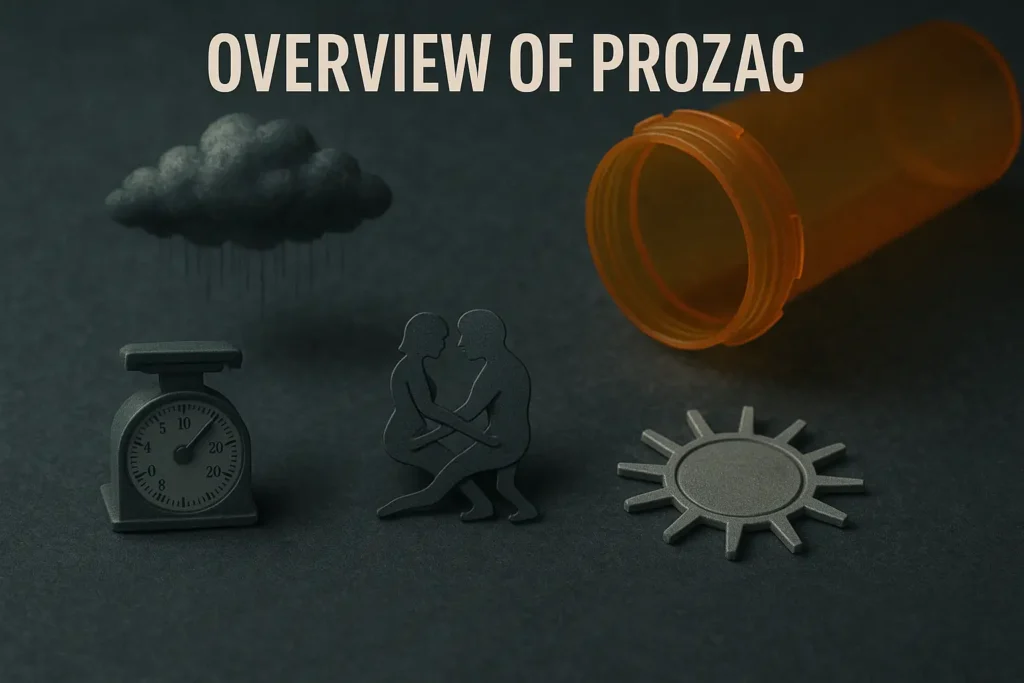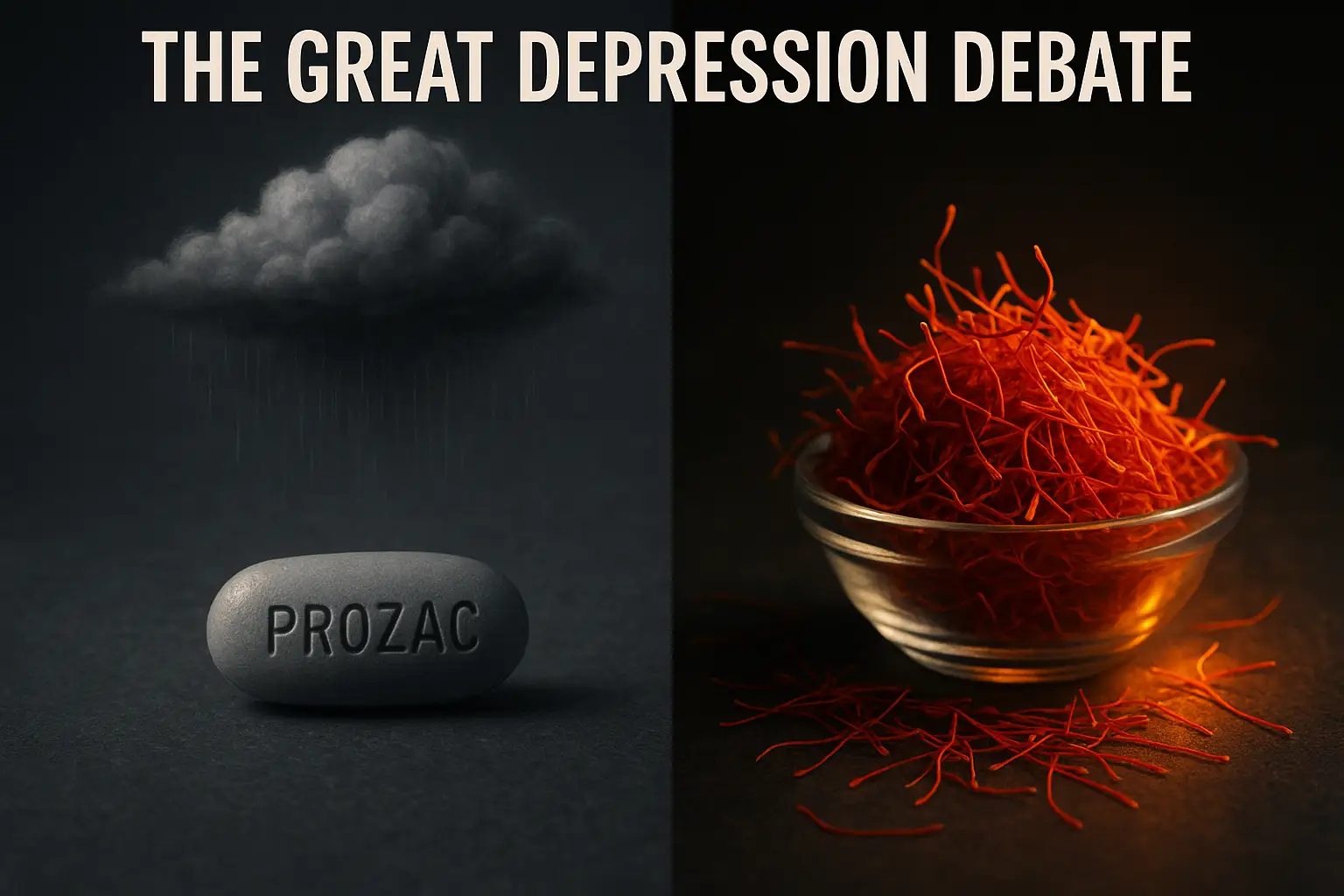Depression is a pervasive mental health disorder that affects millions worldwide, manifesting in a spectrum of emotional, physical, and cognitive symptoms that can disrupt daily life. Characterized by persistent sadness, lack of interest in enjoyable activities, and a myriad of other debilitating symptoms, depression not only impacts individuals but also the communities around them. As the world grapples with this silent epidemic, the quest for effective treatments remains at the forefront of medical research and discussion.
This blog post delves into the comparative effectiveness and side effects of two prominent depression treatments: Prozac, a widely prescribed pharmaceutical, and saffron, a natural spice heralded for its medicinal properties. While Prozac is known for its efficacy in managing depression symptoms, it comes with a suite of potential side effects ranging from weight gain to mood swings. In contrast, saffron presents a natural alternative, with studies suggesting it can combat depression effectively without the harsh side effects. Our exploration will not only highlight key benefits and drawbacks of each but also equip you with knowledge to discuss treatment options more informedly with healthcare providers.
By understanding these treatments in detail, individuals facing depression can make more empowered decisions about their health and well-being. This post aims to provide clear, concise, and useful information on Prozac and saffron, emphasizing their roles in treating depression and the importance of choosing the right treatment approach.
What is Depression?
Depression is a common but serious mood disorder that affects how you feel, think, and handle daily activities. It is characterized by persistent feelings of sadness, loss, or anger that interfere with a person’s everyday activities. Common symptoms include a deep feeling of sadness, loss of interest or pleasure in activities once enjoyed, changes in appetite, trouble sleeping or sleeping too much, loss of energy, increased fatigue, feelings of worthlessness or guilt, difficulty thinking, concentrating or making decisions, and thoughts of death or suicide.
The causes of depression can be complex and vary widely from one individual to another. They may include a combination of genetic, biological, environmental, and psychological factors. For instance, a family history of depression may increase the risk, as can life changes, stress, or trauma.
The treatment of depression is crucial because, without appropriate intervention, it can worsen over time, becoming debilitating and leading to severe complications, including suicide. Treatment typically involves medications, psychotherapy, or a combination of both. However, traditional pharmaceuticals, such as antidepressants, can come with challenges. Although effective for many, these medications can cause a range of side effects including nausea, weight gain, sleep disturbances, and sexual dysfunction, which can affect an individual’s willingness and adherence to treatment.
Understanding the importance of addressing depression is crucial in managing and overcoming the condition. Seeking help from health professionals and discussing various treatment options can provide relief and significantly improve quality of life.
Overview of Prozac
Prozac, scientifically known as Fluoxetine, is one of the most well-known antidepressants used in the treatment of depression, particularly major depressive disorder. It falls under the class of drugs known as selective serotonin reuptake inhibitors (SSRIs). By affecting the chemicals in the brain that may be unbalanced in people with depression, Prozac helps to improve mood, sleep, appetite, and energy level, and restores interest in daily living.

How Prozac Works
Prozac primarily works by increasing the levels of serotonin, a neurotransmitter linked to mood, emotions, and sleep, in the brain. It blocks the reabsorption (reuptake) of serotonin into neurons, making more serotonin available to improve transmission of messages between neurons. This is believed to play a crucial role in reducing symptoms of depression and anxiety.
Common Side Effects
While Prozac is effective in treating depression, it comes with a range of potential side effects that patients must manage:
- Weight Gain: One of the more common complaints from those prescribed Prozac is weight gain.
- Mood Swings: Some users experience emotional instability and mood swings.
- Sexual Dysfunction: This can include decreased sexual desire, delayed ejaculation, and difficulties with sexual performance.
- Insomnia or Sleepiness: Prozac can affect sleep patterns, causing either insomnia or an increased need for sleep.
- Gastrointestinal Issues: Nausea, diarrhea, and indigestion are common in the early stages of treatment.
Other potential issues include headaches, dry mouth, and significant sweating. It’s important for patients and healthcare providers to closely monitor these side effects, as they can impact overall quality of life and treatment adherence.
Understanding both the therapeutic benefits and the side effects of Prozac is crucial for anyone considering this medication as part of their treatment plan for depression. Always consult with a healthcare provider to determine the best course of action.
Saffron as a Natural Alternative
Saffron, known scientifically as Crocus sativus, has been valued for centuries not only as a spice but also for its numerous health benefits. Historically, saffron was prized in traditional medicine systems across ancient Persia, Greece, and Rome, where it was used to treat everything from heart ailments to sleep disorders. Its rich, golden threads were believed to improve mood and possess ‘sunnier’ qualities, making it a natural antidepressant.
Saffron in Modern Depression Treatment
Recent scientific studies have bolstered the traditional claims of saffron’s mood-enhancing properties. Research indicates that saffron may increase levels of serotonin in the brain, similar to how conventional antidepressants work but without the harsh side effects. A meta-analysis published in the Journal of Integrative Medicine found that saffron was just as effective as Prozac in reducing symptoms of depression in adults, highlighting its potential as a viable natural treatment.
Benefits of Saffron Over Conventional Treatments
One of the most compelling aspects of saffron as an alternative treatment for depression is its safety profile. Studies have shown that saffron has minimal side effects compared to those often associated with pharmaceutical antidepressants, such as weight gain and sexual dysfunction. This makes saffron an appealing option for those seeking a natural approach to manage their depression.
The therapeutic benefits of saffron, combined with its low risk of side effects, suggest that it can be a significant aid in the treatment of depression, particularly for those who are sensitive to the adverse effects of conventional medications.
By embracing saffron’s historical backdrop and its modern scientific validation, individuals looking for alternatives to traditional pharmaceuticals can consider this natural remedy as a potentially effective and gentle option for managing depression.
Incorporating saffron into one’s diet can be as simple as adding it to teas, dishes, or taking it in supplement form, making it a versatile and enriching addition to a holistic approach to wellness, particularly for those dealing with moderate to severe depression.

Comparative Analysis: Prozac vs. Saffron
In the search for effective treatments for depression, both Prozac and saffron have been studied extensively, but their approaches and side effects vary significantly. This section explores their comparative effectiveness and the differing side effects associated with each.
Effectiveness of Prozac vs. Saffron
Several studies have put Prozac and saffron head-to-head to evaluate their efficacy in treating depression. A systematic review and meta-analysis of randomized controlled trials, published in Phytomedicine, found that saffron was just as effective as Prozac in reducing symptoms of mild to moderate depression. The analysis included various studies that compared the effects of saffron extracts against placebo and conventional SSRIs like Prozac.
Side Effects Comparison
The side effects associated with Prozac and saffron are markedly different, largely due to their chemical makeup and the body’s response to these treatments:
- Prozac: As a chemical antidepressant, Prozac can cause several side effects. Common ones include nausea, drowsiness, dizziness, anxiety, insomnia, loss of appetite, and increased sweating. More severe side effects might include significant weight gain, sexual dysfunction, and severe mood swings.
- Saffron: On the other hand, saffron, being a natural substance, typically presents fewer and less severe side effects. The most common include mild digestive disturbances and possible allergic reactions in sensitive individuals. Its natural composition makes it less likely to cause severe side effects seen with synthetic drugs.
The choice between Prozac and saffron may depend on an individual’s specific situation, including their medical history, the severity of their depression, and how they respond to different treatments. While Prozac might be more suitable for severe depression requiring strong, immediate intervention, saffron offers a gentler alternative with a lower risk of adverse effects for managing mild to moderate depression.
It’s important for individuals considering these treatments to consult with healthcare providers to discuss all available options, including the benefits and risks associated with each treatment. This comprehensive approach ensures that each person can find the treatment that best suits their needs and lifestyle, potentially improving their quality of life and managing their depression more effectively.
How to Use Saffron for Depression
Saffron, recognized for its bright color and distinctive flavor, is not just a culinary delight but also a promising natural treatment for depression. When considering saffron for depression, it’s important to understand how to use it safely and effectively.
Guidelines for Safe Usage
To use saffron safely for depression, it’s crucial to adhere to recommended dosages and be aware of its source quality. Pure, high-quality saffron is essential to ensure effectiveness and minimize risks. Always purchase saffron from reputable suppliers to avoid adulterated products.
Suggested Dosage
Research suggests that saffron is effective at treating mild to moderate depression at doses of about 30 mg per day. It is generally recommended to split this dose into two servings—15 mg in the morning and 15 mg in the evening. Before starting any new treatment, consult with a healthcare provider, especially if you’re currently on other medications or have underlying health conditions.
Methods of Consumption
- Tea: One of the simplest ways to incorporate saffron into your routine is by adding it to tea. Steep a pinch of saffron threads (about 15 mg) in hot water or your regular tea. This not only imparts a unique flavor but also delivers saffron’s benefits directly.
- Capsules: Saffron capsules are available for those who prefer a more convenient and precise dosage. These are typically taken once or twice a day, according to the dosage on the package.
- With Food: You can sprinkle saffron on various dishes, like rice, soups, and stews. Incorporating it into your meals can help you enjoy its health benefits along with its taste.
Incorporating saffron into your daily regimen could be a natural and enjoyable way to help manage symptoms of depression. As with any supplement, the key is consistency and monitoring how your body responds to determine if it’s the right treatment for your needs.
Benefits of Saffron Over Prozac
When comparing saffron to Prozac for the treatment of depression, one of the most significant advantages of saffron is its safety profile, particularly the lack of severe side effects often associated with traditional antidepressants.
Reduced Risk of Severe Side Effects
Unlike Prozac, which can cause a range of potentially severe side effects including significant weight gain, sexual dysfunction, and severe mood swings, saffron’s side effects are generally mild and uncommon. This makes saffron a particularly attractive option for those who are sensitive to the more intense side effects of synthetic drugs or those who prioritize a natural approach to health care.
Holistic Benefits of Saffron
Beyond its effectiveness in treating depression, saffron is known for its holistic benefits that extend to various aspects of health and wellness. It has been studied for its potential anti-inflammatory and antioxidant properties, which can contribute to better overall health. Additionally, saffron is known for its potential to improve sleep, enhance skin health, and boost sexual function, making it a multifaceted supplement that supports more than just mental health.

- Sleep Improvement: Saffron can help improve sleep quality due to its mild sedative properties, which can be particularly beneficial for those suffering from depression, as sleep disturbances are a common symptom.
- Skin Health: The antioxidant properties of saffron may contribute to improved skin health by fighting oxidative stress, which can lead to premature aging and skin degradation.
- Sexual Function: Unlike many antidepressants that decrease libido, saffron has been shown in some studies to potentially enhance sexual function and libido in both men and women.
Integrating saffron into one’s daily routine can be done through supplements, by adding it to foods like rice dishes or teas, or as part of a balanced diet. This adaptability, coupled with its broad range of health benefits, makes saffron an excellent natural alternative for managing depression and enhancing overall well-being.
Saffron’s comprehensive advantages highlight its potential not only as an effective natural treatment for depression but also as a component of a broader wellness strategy, supporting various aspects of physical and mental health.
Patient Testimonials and Case Studies
Exploring personal experiences with Prozac and saffron provides valuable insights into how different treatments can affect individuals dealing with depression. The following anecdotes and case studies illustrate the varying outcomes of these treatments.
Case Study: Emily’s Experience with Prozac and Saffron
Emily, a 34-year-old teacher, initially started using Prozac to manage her symptoms of moderate depression. While she found that Prozac effectively alleviated her depressive episodes, she struggled with several side effects, including significant weight gain and reduced sexual desire, which affected her quality of life. After doing some research, Emily decided to switch to saffron after consulting with her healthcare provider. She noted that within a few weeks of using saffron, not only did her depression symptoms reduce, but she also experienced none of the side effects that troubled her with Prozac. Furthermore, she mentioned feeling more “holistically” healthy, with improved sleep and overall vitality.
Anecdote: John’s Switch from Prozac to Saffron
John, a 42-year-old software developer, had been on Prozac for several years to manage severe depression. While effective, John was concerned about the long-term impact of Prozac, especially as he experienced mood swings and occasional blurred vision. After learning about saffron’s potential benefits, John transitioned to saffron with his doctor’s guidance. He reported a smoother experience with saffron, highlighting fewer mood disturbances and an overall improvement in his well-being. John appreciated the natural aspect of saffron, stating it aligned better with his lifestyle changes towards more natural living.
Analysis
These cases reflect a common theme: while Prozac is highly effective for many, its side effects can be burdensome, leading some to seek alternatives like saffron. Saffron’s appeal lies not only in its efficacy but also in its minimal side effects, which are particularly attractive to those already burdened by the impacts of depression.
Both Emily and John’s experiences underscore the importance of personalized treatment plans in managing depression. They also highlight the potential of saffron as a beneficial alternative for those looking for natural treatment methods without compromising effectiveness.
These stories are just a snapshot of how varied treatment responses can be. They suggest a growing interest in and viability of natural treatments like saffron, particularly for individuals who prioritize holistic health and wish to avoid the harsher side effects of conventional medications.
Considerations Before Choosing a Treatment
When considering treatment options for conditions like depression, consulting with healthcare providers is crucial. This step ensures that you receive a treatment plan tailored specifically to your needs and circumstances.
Importance of Consulting Healthcare Providers
Before starting any new treatment, whether it’s a conventional pharmaceutical like Prozac or a natural supplement like saffron, it’s essential to discuss all options with a healthcare professional. Physicians, psychiatrists, or qualified healthcare providers can offer insights based on the latest research and their clinical experience. They can evaluate the potential benefits and risks associated with each treatment option in the context of your medical history, current health status, and other medications you may be taking.
Personalized Medical Advice
Personalized medical advice is fundamental in managing health conditions effectively. Each individual’s body chemistry and psychological makeup are unique, and what works well for one person might not be suitable for another. A healthcare provider can help navigate the complexities of treatment options and ensure that decisions are made based on comprehensive diagnostic assessments and personal health objectives.
- Tailored Treatment Plans: Medical professionals can tailor treatment plans that address both the symptoms and root causes of depression, adjusting strategies as necessary to optimize outcomes.
- Monitoring and Adjustments: Regular follow-ups with a healthcare provider allow for the monitoring of treatment efficacy and side effects. This ongoing evaluation ensures that the treatment remains effective and adjusts to any changes in your health condition.
Consulting with a healthcare provider is not just a precaution; it’s a critical step in ensuring that the treatment chosen aligns with your overall health goals and leads to the best possible outcomes. It also helps in understanding the full spectrum of options available, from traditional medications to alternative therapies, ensuring a comprehensive approach to health and well-being.
Conclusion
As we conclude our exploration of saffron as a natural treatment for depression compared to Prozac, it’s important to reflect on the key points discussed and consider the broader implications for individuals seeking alternatives to traditional pharmaceuticals.
Recap of Saffron’s Benefits
Saffron has shown promising results as a natural antidepressant with the potential to treat depression effectively without the severe side effects commonly associated with drugs like Prozac. Its benefits extend beyond mood enhancement, offering improvements in overall well-being, sleep quality, and potentially even sexual health. These holistic advantages make saffron not only a compelling option for those dealing with depression but also for anyone interested in natural health solutions.
The Case for Natural Alternatives
The journey through various studies and personal testimonials underscores the importance of considering natural alternatives like saffron. While traditional medications remain vital for many, the potential of natural treatments to offer relief with fewer side effects cannot be overlooked. Saffron represents a bridge between ancient herbal wisdom and modern scientific validation, providing a testament to the possibilities inherent in nature.
Encouragement to Consult Healthcare Providers
If you or someone you know is struggling with depression, consider discussing saffron and other natural treatments with a healthcare provider. It’s essential to approach this conversation with openness, equipped with information on both the benefits and limitations of natural alternatives. Healthcare providers can help tailor a treatment plan that aligns with your individual health needs and preferences, ensuring the best possible outcome.
As we move forward, let us remain open to the potential of natural remedies like saffron, while always prioritizing safety and efficacy through informed choices and professional guidance. By doing so, we embrace a comprehensive approach to mental health that honors both scientific insight and natural healing traditions.
Ressources
- National Center for Complementary and Integrative Health (NCCIH)
This site offers comprehensive information on various natural and complementary treatments for depression, including saffron. You can find research articles, safety information, and current scientific findings about a wide range of herbal supplements.
Visit NCCIH - PubMed Central
An invaluable resource for accessing scientific studies, including those on saffron’s effectiveness as a treatment for depression. You can search for peer-reviewed articles and clinical trial results to get detailed scientific insights.
Explore PubMed - Books on Herbal Medicine and Depression
Several books provide in-depth information about using herbal remedies, including saffron, for health issues like depression. Titles such as “The Herbal Medicine-Maker’s Handbook” by James Green and “Healing Depression the Mind-Body Way” by Nancy Liebler and Sandra Moss are great starting points.
Find Books on Amazon

